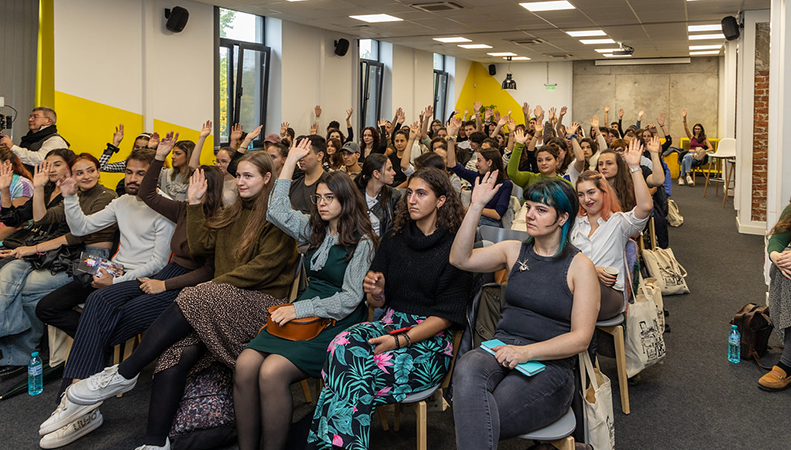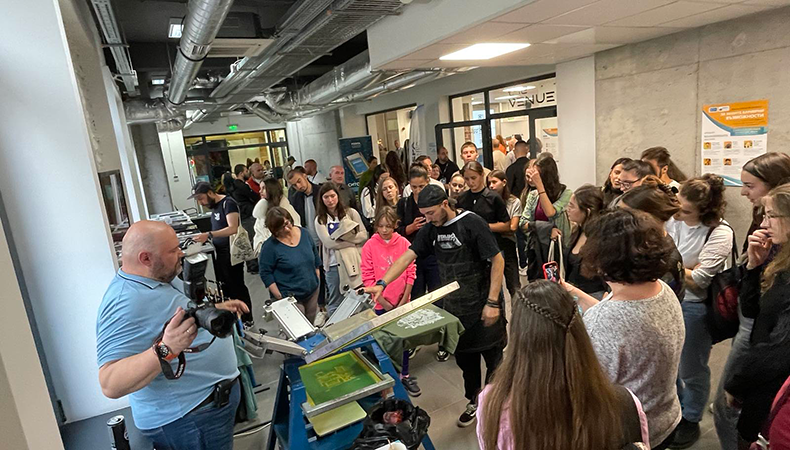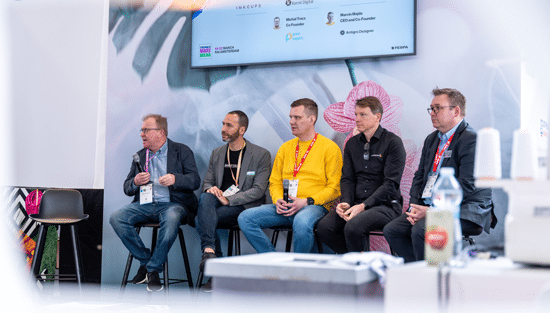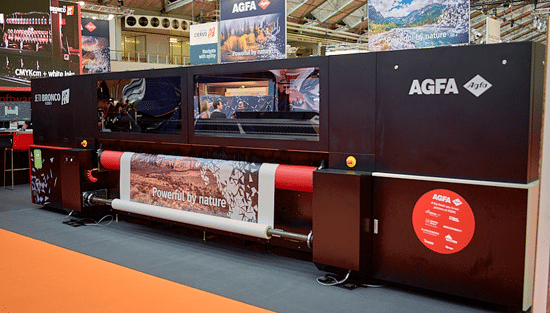FESPA Bulgaria: inspiring youth

Dessy Todorova, Secretary of FESPA Bulgaria, describes how a Careers Show helped ignite a passion for printing in young people.
Tell us a little about you and your career journey…
I’ve been working in the print industry for 20 years. I’m the co-founder and co-owner of Polygraphy Info, a media platform consisting of six websites that provide information and marketing services for print companies.
We have expanded our services by creating a recruitment agency (Dotbrain.eu) that offers employer branding services – something almost unknown in our industry until three or four years ago.
 Dessy Todorova
Dessy Todorova
My company is one of the 11 co-founders of the Bulgarian Association of Contemporary Graphic Print (now FESPA Bulgaria). I served as a board member for eight years and currently hold the position of Secretary.
But the most important part of my work is creating interest in print among young people and offering them new opportunities to grow in the profession.
What problems do you have in Bulgaria around recruiting and retaining young people?
The printing industry in Bulgaria is facing real staffing difficulties. On one hand, like elsewhere in Europe, young people have little interest in production-based or physical jobs. On the other hand, we face immense competition: young people often migrate to Western Europe, and those who stay are drawn to the IT industry, which offers opportunities in modern professions among young professionals in large companies.
In contrast, the printing industry is composed mainly of small, family-owned companies: 90% have fewer than 20 employees. These companies have flat organisational structures with limited career advancement opportunities. The average age of employees is 45 and over. The work is often in production facilities that aren’t necessarily well organised or particularly attractive.
Attracting people to the industry requires a change in mindset. Print companies need to leave behind the 1990s when having a technological edge was enough. Back then, competition was low, profits were high, employees were well paid and people lined up to work. Things are very different today, and those who don’t understand this risk ending up with unmotivated, low-skilled workers who feel no connection to the company.
Every print shop must look inward and learn how to present itself as an appealing employer. Each company has many strengths, which may seem obvious to us but need to be communicated clearly to potential candidates. Here are a few of those strengths:
-
The printing business is family-based. Companies are typically small, giving each employee a meaningful place in the team. Rather than being an anonymous worker on an assembly line in a large factory, a print shop employee can hold an important role in a small company. They receive much more personal attention, training and support in their work and are often more valued and respected.
-
Printing combines creativity and technology. The work is diverse and dynamic. Today, most print shops have welcoming environments where employees can engage with the latest software, technologies and materials. Employees have the opportunity to learn and develop every day.
-
Our work is public-facing. Few other industries offer the same sense of pride and satisfaction as seeing the products you have created in every shopping centre, jewellery store, pharmacy, bookstore, public building, and so on. We all remember the pride and excitement of seeing our first manufactured package, book, poster or banner in a public place.
-
People are motivated and engaged when they work for businesses that are growing. They don’t necessarily seek large corporations. They want to be part of companies with a vision, clear goals and the drive to be market leaders. Everyone loves success, and when a company enables employees to be part of that success, it fosters loyalty and pride in their work.
How are the education/private sectors helping?
Bulgaria’s 20th-century socialist ‘experiment’ caused significant harm, holding back entrepreneurship and private business development. Perhaps the only positive legacy from that era was the education system. In Bulgaria, we had a dual education model for technical professions that produced highly skilled professionals with strong theoretical knowledge and hands-on experience. To this day, Bulgaria is known for its excellent mathematicians, engineers and technically skilled workers – many of whom were the pioneers of the printing industry after socialism.
Unfortunately, in the past 30 years, that connection with education has been lost, as the focus shifted mainly to higher education. But this isn’t where the talent for the printing industry is developed.
The good news is that for the past two to three years, we have been reintroducing a dual education system in secondary schools, based on German and Austrian models. FESPA Bulgaria’s long-term goal is to support young people from their school years and provide them with career opportunities.
Tell us about the recent Careers Show.
Part of FESPA Bulgaria’s Youth Programme, our recent Careers Show was a first for us. As the Events Manager for FESPA Bulgaria, my concept for the event was simple: to inspire a young person who knows nothing about our profession you need to show them successful young people who have gone that way before.
 FESPA Bulgaria Careers Show 2024
FESPA Bulgaria Careers Show 2024
We invited six speakers from our industry to tell their stories of success, who included a multiple World Wrap Masters champion (Ivan Tenchev); the creator of an innovative board game that raised full funding in just 20 hours on Kickstarter (GEMJI); the most-awarded branding studio in Bulgaria, and winner of a Red Dot Award (Inkpression); a start-up innovating in eco-friendly laminating solutions (LAM’ON); and a screen printing studio that has organised hundreds of workshops, inspiring young people to engage with printing (Sito Studio).
Their success stories showed that printing can offer career and business opportunities, financial success and prestige not only in Bulgaria but worldwide.
Alongside this, we had a strong social media campaign, outstanding visuals and the best slogan: Create. Inspire. Print. I’d like to give special thanks to Graeme Richardson-Locke and FESPA for providing us with these fresh and modern layouts for the campaign, which resonated beautifully with the young audience.
What were your memorable moments from the event?
We had 130 attendees at the event, and not a single person left before it ended. We set up a Print Zone where people could do their own printing, and there was a long queue of people eager to get involved in the printing process. Our speakers were surrounded for hours by young people asking them additional questions. We had to extend the event by two hours because people didn’t want to leave.
 The Print Zone at FESPA Bulgaria’s Careers Show
The Print Zone at FESPA Bulgaria’s Careers Show
After the event, a survey revealed not only positive feedback but also that young people are eager for more events, increased interaction with us, additional job offers and new possibilities.
What about FESPA Bulgaria – have you seen a change in membership in recent years? What is the organisation focusing on now and in the coming year?
Bulgaria is a very small market. There are no more than 1,200 printers: offset, screen, flexo, wide format and digital. There are also fewer than 2,000 advertising agencies with or without production. Typically, our membership consists of 25 to 35 companies. But these are stable companies with excellent reputations on the market and growing businesses. Increasing membership numbers is not our main goal; we aim to support the development of the industry and strengthen the FESPA brand in our country.
What is the value of FESPA Global Expo and other events to FESPA Bulgaria?
The FESPA Global Expo and all the other FESPA events are extremely important to us. If someone wants to stay ahead in business, there’s no better place to do it. While other printing expos focus on technology and tools, FESPA events showcase products, provide inspiration and new business perspectives.
Become a FESPA member to continue reading
To read more and access exclusive content on the Club FESPA portal, please contact your Local Association. If you are not a current member, please enquire here. If there is no FESPA Association in your country, you can join FESPA Direct. Once you become a FESPA member, you can gain access to the Club FESPA Portal.
Recent news

The personal touch: visit Personalisation Experience’s SmartHub Conference 2025
Join the SmartHub Conference at Personalisation Experience next month to stay ahead of the latest tech and trends.

How to build brand trust using customer reviews
Reviews can benefit or damage your business’s reputation. From spreading the word to social proof, here is why reviews matter and what you can do to manage your customer reviews to improve your brand’s reputation.

Regulation guidance: Extended Producer Responsibility
Extended Producer Responsibility (EPR) is now in effect. What does it mean for those in the print industry? Sustainability consultant Rachel England outlines everything you need to know.

How to maximise the automation of your production workflow
Workflow automation has evolved beyond basic file prep, now encompassing job submission, prepress, and postpress. Printers automate to boost productivity, cut waste, and address skill shortages. Implementing tailored automation, from RIPs to MIS, optimises throughput and profitability, minimising human intervention.